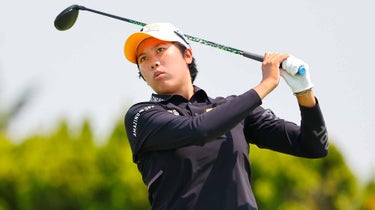
LPGA pro Grace Kim uses a rangefinder during the 2023 KPMG Women’s PGA Championship.
Rich Graessle/Icon Sportswire via Getty Images
Expect the unexpected. In major championships, you can count on seeing something you didn’t count on.
The early goings of the U.S. Women’s Open have delivered on that front. In Thursday’s opening round alone, for instance, world No. 1 Jin Young Ko shot an eyebrow-raising seven-over 79 that left her tied for 126th in a 156-player field. Another head-turner came from Michelle Wie West, who managed to make a triple-bogey 8 on the seaside par-5 18th hole without hitting a ball in the water; she left a shot nesting in a tree.
Another of Day One’s unexpected moments centered on a player of less prominent stature: LPGA rookie Natthakritta Vongtaveelap, who was disqualified after her caddie used a rangefinder on multiple occasions.
A slip-up of that kind on such an elite stage? That was a surprise. But the thing about surprises is that they often double as teachable moments. If we’re lucky, we learn from them.
You can see where this is headed.
Now, it would seem, is as good a time as ever for a quick refresher on the rules around rangefinders. You’re forgiven for not knowing them cold.
On January 1, 2019, after a long life as golf outlaws, the gizmos also known as as DMDs (distance measuring devices) were brought into the fold. They were declared legal—with qualifications. Under Rule 4.3a, rangefinders were allowed, but not all of their functions, and not in all events. As the written guidelines note, a “golf course or the Committee in charge of a competition does have the option to prohibit the use of distance-measuring devices by Local Rule.”
Not all tournament guidelines are the same. Consider, for instance, the USGA’s own competitions. In big amateur events (the U.S. Amateur and the U.S. Junior Amateur, for example) competitors and their caddies can use rangefinders, but not the slope function. In all of the Open championships, on the other hand, rangefinders are forbidden. Vongtaveelap was DQ’d under that Local Rule.
Rule 4.3a allows players to carry devices with prohibited functions, provided they don’t use those functions. In this case, though, the caddie was seen employing the rangefinder more than once, and he acknowledged as such his misunderstanding.
It was, in other words, a simple ruling. And it reminds us of a few other words to live by. In any tournament, expect the unexpected. And always check the Local Rules.
All of our market picks are independently selected and curated by the editorial team.
If you buy a linked product,
GOLF.COM may earn a fee. Pricing may vary.
SHOP TOP RANGEFINDERS AND GPS DEVICES
Find the perfect rangefinder or GPS device for you at Fairway Jockey.











